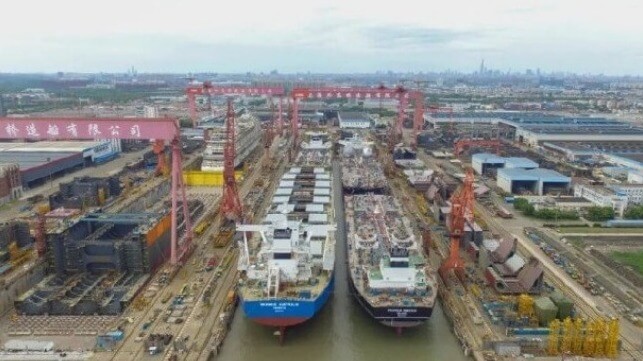Canadian Shipbuilders Calls for 100 Percent Tariff on Chinese-Built Ships

The Canadian Marine Industries and Shipbuilding Association (CMISA) this week issued a call for the Canadian government to impose a 100 percent tariff on Chinese-built ships as a step to protect domestic capabilities and national security. The move comes after Canada announced a similar tariff on Chinese-made electrical vehicles and as the United States is also reviewing a trade complaint from its unions lodged against the Chinese shipbuilding industry.
The Canadian lobbying group highlights that China’s shipbuilding industry is part of a doctrine of civil-military fusion where they contend commercial ship exports are subsidized to strengthen the country’s military capabilities. They highlight that the same shipyards that are producing ferries and cargo vessels for the global market are also used to construct warships.
China has rapidly expanded its shipbuilding capabilities and today dominates commercial ship orders. South Korea is the only meaningful competitor that is still able in some months to record the highest value of orders. However, according to data from Clarkson Research, China attracted 63 percent of the total number of ships ordered so far in 2024 versus just a 23 percent share for the South Korean industry. Japan is a distant third for commercial ship orders.
CMISA in its statement alludes to China's naval expansion and entanglements with neighbors as well as more distant incursions such as in the Arctic. They point to reports that Chinese ships have been seen in Canada’s Arctic waters.
“CIMSA calls for immediate and decisive action,” the trade association said in its statement. “We recommend the imposition of a 100 percent surtax on all Chinese-built ships imported into Canada and demand a clear prohibition on any government entity or Crown corporation from acquiring or leasing Chinese-built vessels.”
The appeal singles out the Canadian government-owned, government-funded Marine Atlantic for its recent introduction of a Chinese-built ferry chartered from Sweden's’ Stena group. The vessel which was built in Weihai, China is on a five-year charter to operate on Canada’s Atlantic coast and Marine Atlantic has a purchase option.
The group accuses the company of using this structure to “evade public scrutiny and ethical concerns.” They call on the company to use the five-year charter period to work with the Canadian industry to design and build a domestic vessel instead of ultimately purchasing the Chinese-built ship.
The statement asserts that it is “imperative that the government takes these actions to protect Canadian industries.”
In the U.S., a coalition of major unions filed a trade complaint against the Chinese shipbuilding industry accusing it of unfair business practices, subsidies, and other violations. This complaint is still under review by the US Trade Representative for possible punitive actions. China angrily responded to the complaint saying it was not based on fact and said the problems in the U.S. industry were more deeply seated and not China’s fault.
The Canadian trade group alludes to concerns about working conditions and environmental standards but focuses on what it says are the capabilities of Canadian companies. They reiterate the national security concerns and the need to protect the domestic industry. The Canadian government is undertaking a massive shipbuilding strategy working with three major shipyards to build new government vessels for the navy, coast guard, and Antarctic icebreakers. The ongoing program is part of an effort to shore up Canada’s shipbuilding capabilities while Canada, Finland, and the United States also announced a new cooperation to support the development of icebreakers.
